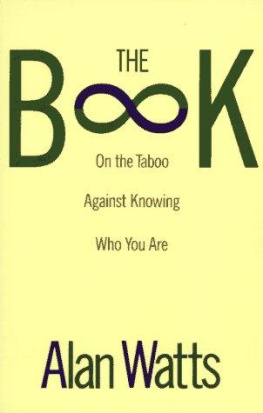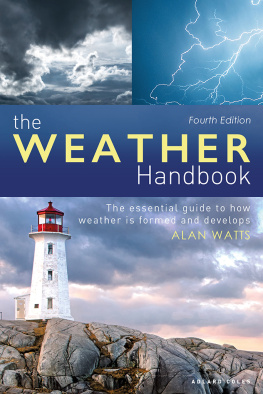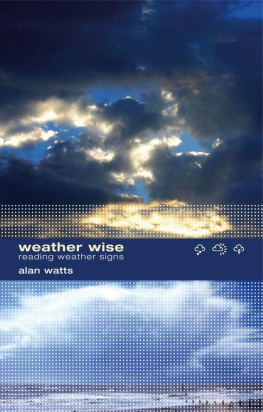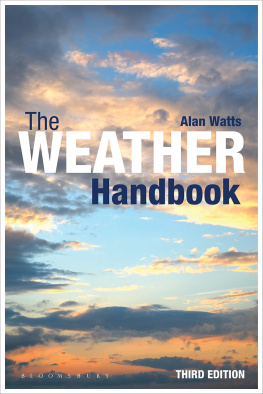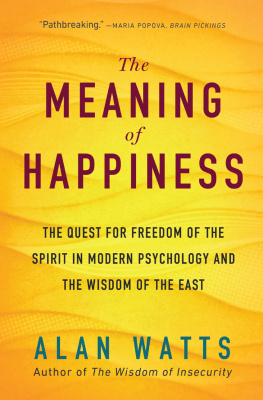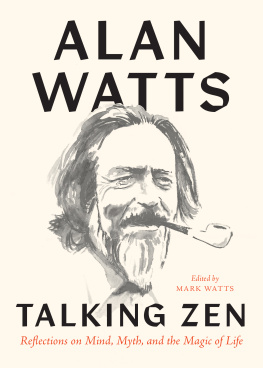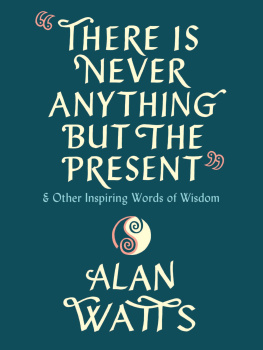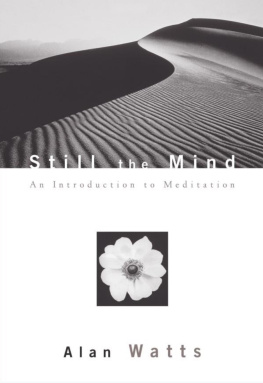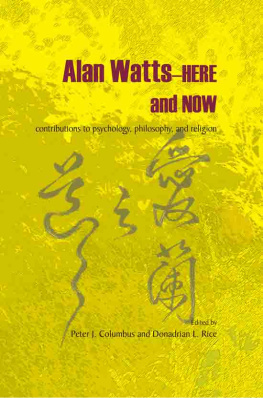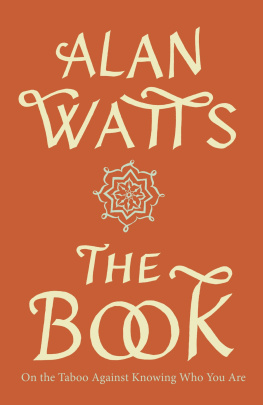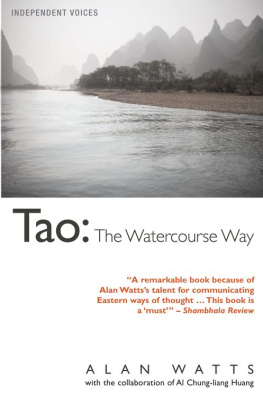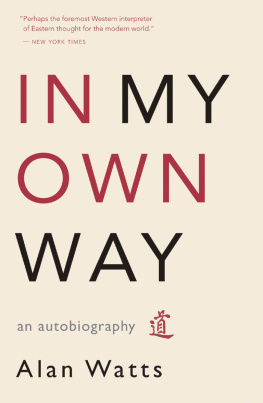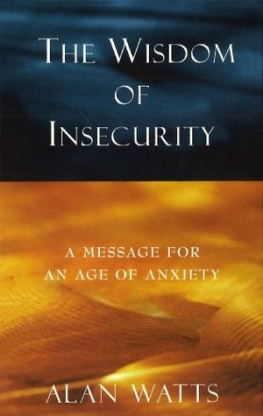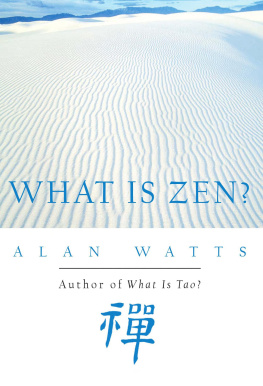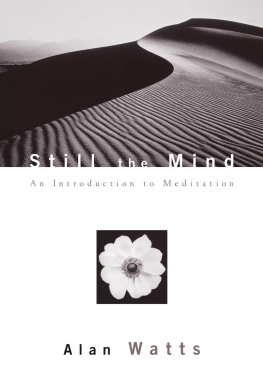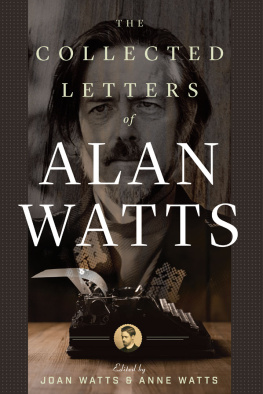THE BOOK
On the Taboo Against Knowing Who You Are
ALAN WATTS
Alan Watts, who died in 1974, held both a master's degree in theology and a doctorate of divinity, and was best known as an interpreter of Zen Buddhism in particular, and of Indian and Chinese philosophy in general. He was the author of many books on the philosophy and psychology of religion, which include The Way of Zen, The Supreme Identity, The Joyous Cosmology,Beyond Theology, Nature, Man and Woman*, Cloud-Hidden, WhereaboutsUnknown* and In My Own Way: An Autobiography.
*Also available in Abacus
Also by Alan Watts in Abacus
NATURE, MAN AND WOMAN
CLOUD-HIDDEN, WHEREABOUTS UNKNOWN
Alan Watts
THE BOOK
On the Taboo Against Knowing
Who You Are
ABACUS edition published in 1973
by Sphere Books Ltd
30/32 Gray's Inn Road, London, WC1X 8JL
Reprinted 1976, 1977
First published in Great Britain
by Jonathan Cape Ltd 1969
Copyright 1966 by Alan Watts
This book is sold subject to the condition that it shall not, by way of trade or otherwise, be lent, re-sold, hired out, or otherwise circulated without the publisher's prior consent in any form of binding or cover other than that in which it is published and without a similar condition including this condition being imposed on the subsequent purchaser.
Set in Monotype Times Roman
Printed in Great Britain by Hazell Watson & Viney LtdAylesbury, Bucks
To my Children and Grandchildren
Joan
Tia
Ann
*
Mark
*
David
Richard
Myra
Elizabeth
Lila
Michael
Christopher
Diane
ACKNOWLEDGMENTS
The author is grateful to the following for permission to quote: Cambridge University Press for The Nature of the Physical World by Sir Arthur Eddington and My View of the World by Erwin Schrdinger; Prentice-Hall Inc.
for Quantum Theory by David Bohm; William Collins & Sons Ltd for TheGospel According to Thomas, translated by A. Guillaumont and others; J. M.
Dent & Sons Ltd for Collected Poems of Dylan Thomas; and Methuen & Co.
Ltd for The Collected Poems of G. K. Chesterton.
CONTENTS
PREFACE
9
Inside Information
The Game of Black-and-White
How To Be a Genuine Fake
The World Is Your Body
So What?
IT
THE BOOKS
PREFACE
THIS BOOK explores an unrecognized but mighty tabooour tacit conspiracy to ignore who, or what, we really are. Briefly, the thesis is that the prevalent sensation of oneself as a separate ego enclosed in a bag of skin is a hallucination which accords neither with Western science nor with the experimental philosophy-religions of the Eastin particular the central and germinal Vedanta philosophy of Hinduism.
This hallucination underlies the misuse of technology for the violent subjugation of man's natural environment and, consequently, its eventual destruction.
We are therefore in urgent need of a sense of our own existence which is in accord with the physical facts and which overcomes our feeling of alienation from the universe. For this purpose I have drawn on the insights of Vedanta, stating them, however, in a completely modern and Western styleso that this volume makes no attempt to be a textbook on or introduction to Vedanta in the ordinary sense. It is rather a cross-fertilization of Western science with an Eastern intuition.
Particular thanks are due to my wife, Mary Jane, for her careful editorial work and her comments on the manuscript. Gratitude is also due to the Bollingen Foundation for its support of a project which included the writing of this book.
Sausalito, California
ALAN WATTS
January, 1966
CHAPTER ONE
INSIDE INFORMATION
JUST WHAT should a young man or woman know in order to be "in the know"? Is there, in other words, some inside information, some special taboo, some real lowdown on life and existence that most parents and teachers either don't know or won't tell?
In Japan it was once customary to give young people about to be married a "pillow book." This was a small volume of wood-block prints, often colored, showing all the details of sexual intercourse. It wasn't just that, as the Chinese say, "one picture is worth ten thousand words." It was also that it spared parents the embarrassment of explaining these intimate matters face-to-face. But today in the West you can get such information at any newsstand. Sex is no longer a serious taboo.
Teenagers sometimes know more about it than adults.
But if sex is no longer the big taboo, what is? For there is always something taboo, something repressed, unadmitted, or just glimpsed quickly out of the corner of one's eye because a direct look is too unsettling. Taboos lie within taboos, like the skins of an onion. What, then, would be The Book which fathers might slip to their sons and mothers to their daughters, without ever admitting it openly?
In some circles there is a strong taboo on religion, even in circles where people go to church or read the Bible. Here, religion is one's own private business. It is bad form or uncool to talk or argue about it, and very bad indeed to make a big show of piety. Yet when you get in on the inside of almost any standard-brand religion, you wonder what on earth the hush was about. Surely The Book I have in mind wouldn't be the Bible, "the Good Book"that fascinating anthology of ancient wisdom, history, and fable which has for so long been treated as a Sacred Cow that it might well be locked up for a century or two so that men could hear it again with clean ears. There are indeed secrets in the Bible, and some very subversive ones, but they are all so muffled up in complications, in archaic symbols and ways of thinking, that Christianity has become incredibly difficult to explain to a modern person. That is, unless you are content to water it down to being good and trying to imitate Jesus, but no one ever explains just how to do that.
To do it you must have a particular power from God known as "grace,"
but all that we really know about grace is that some get it, and some don't.
The standard-brand religions, whether Jewish, Christian, Mohammedan, Hindu, or Buddhist, areas now practicedlike exhausted mines: very hard to dig. With some exceptions not too easily found, their ideas about man and the world, their imagery, their rites, and their notions of the good life don't seem to fit in with the universe as we now know it, or with a human world that is changing so rapidly that much of what one learns in school is already obsolete on graduation day.
The Book I am thinking about would not be religious in the usual sense, but it would have to discuss many things with which religions have been concernedthe universe and man's place in it, the mysterious center of experience which we call "I myself," the problems of life and love, pain and death, and the whole question of whether existence has meaning in any sense of the word. For there is a growing apprehension that existence is a rat-race in a trap: living organisms, including people, are merely tubes which put things in at one end and let them out at the other, which both keeps them doing it and in the long run wears them out. So to keep the farce going, the tubes find ways of making new tubes, which also put things in at one end and let them out at the other.
At the input end they even develop ganglia of nerves called brains, with eyes and ears, so that they can more easily scrounge around for things to swallow. As and when they get enough to eat, they use up their surplus energy by wiggling in complicated patterns, making all sorts of noises by blowing air in and out of the input hole, and gathering together in groups to fight with other groups. In time, the tubes grow such an abundance of attached appliances that they are hardly recognizable as mere tubes, and they manage to do this in a staggering variety of forms.
Next page
